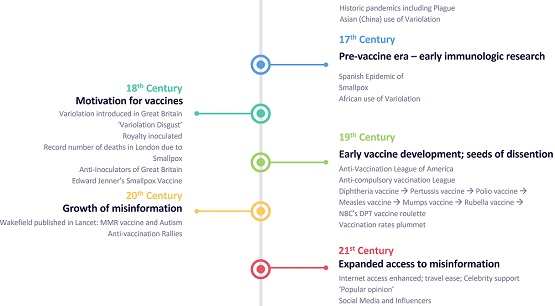Author: Jeff Barrett, PhD, FCP, FISoP on April 26, 2022 
As part of a course on vaccine development, students are exposed to the phases of vaccine development focused on R&D activities, timing, and cost considerations as well as key features that are distinctly different from drug development. Additional activities and nuances such as the use of global burden of disease data, establishment of correlates of protection and correlates of risk in addition to the impact of organizations such as the CDC, ACIP, and global regulatory input from the WHO are also addressed in class. In the wake of the recent COVID-19 pandemic, several other factors have also been identified as relevant, deserving of class time, emphasis, and discussion. One of the more intriguing factors that has impacted both vaccine uptake and vaccine effectiveness within and across geographic regions has been the impact of anti-vaccination campaigns. Recently, last year's class published a summary of an assignment on reviewing the impact of anti-vaccination campaigns along with recommendations for how these sentiments can be more appropriately dealt with in a constructive manner. The message has been well received thus far, and it has highlighted the necessity of proactive engagement with the antivaccination community along with constructive messaging and social media engagement. More to the point, the assignment highlighted the necessity of engaging young clinical and translational scientists to review this issue thoroughly and to seek constructive solutions from them.
Engaging the next generation of clinical and translational scientists is a unique opportunity and responsibility. As teachers we need to embrace both the science and the necessity for critical thinking. We, the community of clinical and translational scientists, definitely benefit from their perspectives both from the standpoint of their youth and their experience (growing up in a different generation from those of us who have been at it longer), which is often underestimated. One of the obvious realities from this exercise has been the benefit of merging the historical context with current views representing multiple viewpoints as well as the reality that students are better positioned to address the impact of certain technologies and social media campaigns. This is a complex issue that is often confounded with politicization, misinformation campaigns in general, and evolving science. My overall assessment is that it is critically important to engage and trust the next generation as they will quickly inherit the both the mantle of the work and the responsibility for solutions.

The comment feature is locked by administrator.